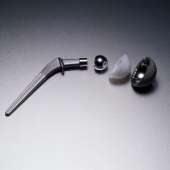Skin tests catch metal sensitivity before joint replacement

(HealthDay) -- Testing patients for metal hypersensitivity before they receive joint or bone implants helps identify those at increased risk for complications due to metal hypersensitivity, a new study shows.
The researchers noted that nickel is a common component in alloys (a mixture of two or more metals) and is also a leading cause of contact dermatitis (allergic skin reaction) associated with metals.
The study included 31 patients who underwent skin patch testing for metal hypersensitivity before receiving joint or bone implants (preimplantation group) and 41 who were tested after they received an implant (postimplantation group).
Among those in the preimplantation group, 21 (68 percent) reacted to one metal and 15 reacted to more than one metal. For all patients who reacted to metals, surgeons used an implant that did not include metal. None of these patients developed skin problems or early joint loosening during follow-up.
Among those in the postimplantation group, those with a positive skin patch test were much more likely to have a clinical history of metal hypersensitivity than those without a positive result.
Chronic pain at the site of the implanted metal device was the most common reason why patients in this group were referred for a patch test. Ten patients had at least one positive patch test to a metal that was a component of their implant. Six of those patients had the implant removed and their symptoms ceased. The four patients who did not have their implants removed continued to experience problems.
"In conclusion, the results of this study support the value of patch testing for patients with a clinical history of metal hypersensitivity before surgical implant in bone or a joint as a safe measure to avoid complications," wrote Dr. Natasha Atanaskova Mesinkovska and colleagues with the Cleveland Clinic, in a journal news release.
"The study confirms the need for surgeons and dermatologists to work together and establish guidelines with a goal to identify patients who would benefit from revisions of previously implanted metal," they added.
The study appeared online Feb. 20 in the journal Archives of Dermatology.
More information: The U.S. National Institute of Arthritis and Musculoskeletal and Skin Diseases has more about joint replacement.
Copyright © 2012 HealthDay. All rights reserved.















